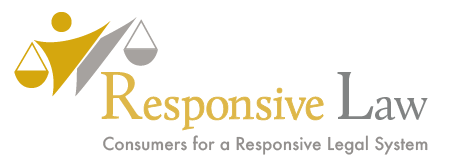Dental Examiners Case Pushes State Bars to Reduce Self-Governance
6/7/2015
Written by Briane Cormish
As we reported previously, Responsive Law joined in an amicus brief in the U.S. Supreme Court case of North Carolina Board of Dental Examiners v. Federal Trade Commission (hereinafter referred to as the Dental Examiners case). In the amicus brief, we brought to the Supreme Court’s attention the access to justice gap in America that is caused by over-regulation of the legal market and high barriers to entry that benefit lawyers at the expense of the public interest. We encouraged the Court to rule in favor of the FTC to ensure that regulations protect consumers, not market participants. The decision, handed down on Feb 25th, 2015, did just that.
In the Dental Examiners decision, the Supreme Court opinion that state regulatory agencies, if controlled by members of the professions they oversee and operating without any active supervision by the state, violate antitrust laws. The defendants in the Dental Examiners case were not lawyers. They were dentists. The Supreme Court recognized that allowing any body of professionals to regulate themselves creates a tangible threat of antitrust violations by acting in ways that further their own interests. In the realm of the law we have seen that state bars’ enforcement of unauthorized practice of law restrictions increases prices to the detriment of consumers while decreasing consumer choice.
State supreme court oversight is an improvement over no oversight at all, but for the oversight to be most effective, it needs to come from the elected branches of government. The legislative and executive branches are best positioned to provide oversight over these agencies so that they are not policing themselves. Nevertheless, the decision, as we hoped, is already having broader ramifications on the legal profession.
As reported in the Michigan Law Journal, a number of state bars are currently working with their legislatures and state attorneys to analyze if they are in compliance with the Dental Examiners decision. Currently, the North Carolina legislature is considering a bill that would further define the practice of law and establish a method of active supervision. The bill would additionally establish the attorney general, as opposed to the state bar, as the body that must first respond to unauthorized practice of law claims. Other states have plans to create an “umbrella authority” over their regulatory and licensing boards as a mechanism to comply specifically with the “active supervision” requirement.
In contrast, the State Bar of Michigan believes that it already has safeguards in place to avoid an antitrust claim; specifically they claim that their regulations are drastically different from the regulation described in the Dental Examiners decision. The Michigan bar argues that, for starters, it has limited statutory authority to investigate and prosecute unauthorized practice of law allegations. Additionally, its limited investigation and prosecution power are currently supervised by the Michigan Supreme Court. Lastly, Michigan claims that their enforcement of unauthorized practice of law claims only happen through the judicial process where those who are accused of violating the UPL have due process rights afforded to them. But not everyone in Michigan believes that the State Bar is in compliance with the Dental Examiners decision. Some note that Michigan does not currently have in place the “active supervision” necessary to comply with the Dental Examiners decision. Additionally, Michigan also lacks a formal definition that clearly articulates what the practice of law is. Neither the Supreme Court of Michigan nor the Michigan legislature has provided a clear definition of the practice of law.
State bars are not the only entities responding to the Dental Examiners case. Public interest organizations are also jumping into action to put pressure on states to comply with the decision. Three public interest consumer organizations have called on all 50 state attorneys general to enforce the high court’s ruling. These organizations have even specifically referenced enforcement within the legal profession by stating the following in their letter:
“[S]tate bars, now comprise majorities — even supermajorities — of licensed professionals in the very economic tribal grouping with an economic interest in restraints of trade benefiting them… State bars controlled by attorneys rarely discipline for excessive billing or intellectual dishonesty…Few require any demonstration whatever of competence in the actual practice area of law relied upon by clients. Few require malpractice insurance, or in any way ameliorate the harm from attorney incompetence. The point is, each of the many agencies within your state is empowered to carve out momentous exceptions from federal antitrust law, and those decisions in particular require a level of independence from the implicit focus of current practitioners.”
Responsive Law is very excited about the developments made so far. We will continue to monitor these developments and push for real oversight of the legal industry that makes it responsive to the people, not only to itself.
Briane Cormish is a Responsive Law legal intern.
